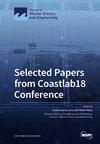Artificial Neural Network-Based Route Optimization of a Wind-Assisted Ship
IF 2.8
3区 地球科学
Q1 ENGINEERING, MARINE
引用次数: 0
Abstract
The International Maritime Organization aims for net-zero carbon emissions in the maritime industry by 2050. Among various alternatives, route optimization holds an important place as it does not require any additional component-related costs. Especially for wind-assisted ships, the effectiveness of different sailing systems can be improved significantly through route optimization. However, finding the ship’s optimal route is computationally expensive when the totality of possible weather conditions is taken into consideration. To determine the optimal route that minimizes energy consumption, an energy model based on the environmental conditions, ship route and ship speed was built using artificial neural networks. The energy consumed for given input data was calculated using a ship dynamics model and a database was generated to train the artificial neural networks, which predict how much energy is consumed depending on the route followed in given environmental conditions. Then, such networks were exploited to derive the optimal routes for all the relevant operational conditions. It was found that route optimization can reduce the overall ship energy consumption depending on the weather conditions of the environment by up to 9.7% without any increase in voyage time and by up to 35% with a 10% delay in voyage time. The proposed methodology can be applied to any ship by training real weather conditions and provides a framework for reducing energy consumption and greenhouse gas emissions during the service life of ships.基于人工神经网络的风力辅助船舶航线优化
国际海事组织的目标是到 2050 年实现海运业的净零碳排放。在各种替代方案中,航线优化具有重要地位,因为它不需要任何与组件相关的额外成本。特别是对于风力辅助船舶,通过航线优化可以显著提高不同航行系统的效率。然而,如果将所有可能的天气条件都考虑在内,寻找船舶的最佳航线将耗费大量计算资源。为了确定能耗最小的最佳航线,利用人工神经网络建立了一个基于环境条件、船舶航线和船速的能耗模型。利用船舶动力学模型计算了给定输入数据的能耗,并生成了一个数据库来训练人工神经网络。然后,利用这些网络得出所有相关运行条件下的最佳航线。研究发现,航线优化可以在不增加航行时间的情况下,根据环境天气条件将船舶总能耗降低 9.7%;在航行时间延迟 10%的情况下,可将能耗降低 35%。所提出的方法可通过训练真实天气条件应用于任何船舶,并提供了一个在船舶使用寿命期间减少能源消耗和温室气体排放的框架。
本文章由计算机程序翻译,如有差异,请以英文原文为准。
求助全文
约1分钟内获得全文
求助全文
来源期刊

Journal of Marine Science and Engineering
Engineering-Ocean Engineering
CiteScore
4.40
自引率
20.70%
发文量
1640
审稿时长
18.09 days
期刊介绍:
Journal of Marine Science and Engineering (JMSE; ISSN 2077-1312) is an international, peer-reviewed open access journal which provides an advanced forum for studies related to marine science and engineering. It publishes reviews, research papers and communications. Our aim is to encourage scientists to publish their experimental and theoretical results in as much detail as possible. There is no restriction on the length of the papers. The full experimental details must be provided so that the results can be reproduced. Electronic files and software regarding the full details of the calculation or experimental procedure, if unable to be published in a normal way, can be deposited as supplementary electronic material.
 求助内容:
求助内容: 应助结果提醒方式:
应助结果提醒方式:


